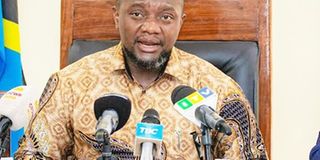Nearly 1 million students selected to join Form One

The Minister of State in the President’s Office (Regional Administration and Local Government), Mr Mohamed Mchengerwa, announces Form One selections in Dar es Salaam yesterday. PHOTO | COURTESY
What you need to know:
- A total of 974,332 students, equivalent to 100 percent of all eligible candidates who passed the 2024 Primary School Leaving Examination have been selected to join Form One in 2025
Dar es Salaam. The government announced on Monday that 974,332 students, equivalent to 100 percent of all eligible candidates who passed the 2024 Primary School Leaving Examination (PSLE) have been selected to join Form One in 2025.
The students include 525,225 girls and 449,107 boys, all of whom will join secondary schools in a single selection process.
Minister of State in the President’s Office, Regional Administration and Local Government, Mr Mohammed Mchengerwa, made the announcement during a press briefing in Dar es Salaam.
“Preparations have been made to ensure all 974,332 students who passed the 2024 PSLE will begin their studies in January 2025. The academic year will commence on January 13, 2025,” Mchengerwa said.
He explained that his office had completed the selection process for Form One students, following guidelines set by the Ministry of Education, Science, and Technology.
“The selection process for Form One students in 2025 was based on candidates’ performance. Every candidate who sat for the 2024 PSLE and scored between 121 and 300 marks has been selected and placed in a government secondary school,” Mr Mchengerwa said.
He further highlighted that the students have been placed in government secondary schools, which fall into two categories: boarding schools and day schools.
Explaining, the boarding school categories, Mr Mchengerwa noted that they are divided into three groups: special schools for high-performing students, technical boarding schools, and national boarding schools.
“Boarding schools are national institutions that have admitted students from various regions based on a quota system designed to foster national unity,” he said.
Regarding the selection process for special schools, Mr Mchengerwa explained that placements were allocated to each region based on the number of students who sat for the PSLE in each respective region. The quotas for each region were evenly distributed among its councils. Schools in this category include Msalato, Mzumbe, Kilakala, Kibaha, Ilboru, Tabora Girls, and Tabora Boys.
For technical boarding schools, placements were similarly allocated by region, taking into account the number of candidates in each region. Schools in this category include Tanga Tech, Moshi Tech, Musoma Tech, Bwiru Boys, Ifunda Tech, Iyunga Tech, Mtwara Tech, Mwadui Tech, and Chato Tech.
National Boarding Schools placed students across councils, based on the number of candidates from each council.
Mr Mchengerwa said that the 2025 Form One placement included special schools, with 809 students (329 girls and 480 boys) selected for special schools such as Ilboru, Msalato, Kibaha, Kilakala, Mzumbe, Tabora Boys, and Tabora Girls.
He said 1,174 students (197 girls and 977 boys) were placed in technical boarding schools like Ifunda Tech, Bwiru Boys, and others, while 6,810 students (5,199 girls and 1,611 boys) were admitted to national boarding schools, including 3,320 girls placed in regional science secondary schools.
Meanwhile, he said that day schools included 965,539 students (519,500 girls and 446,039 boys) who were placed in nearby day secondary schools.
The minister also provided directives regarding the implementation of the revised curriculum for pre-primary, primary, and secondary education. He emphasized that efforts to ensure the curriculum’s success will continue.




